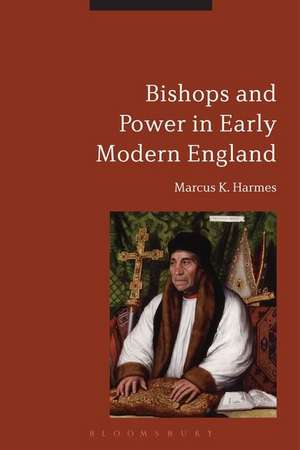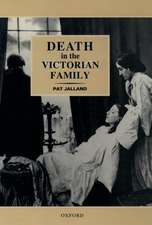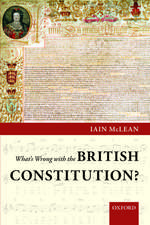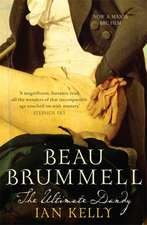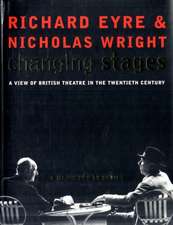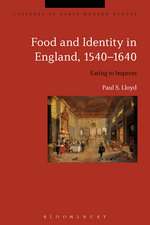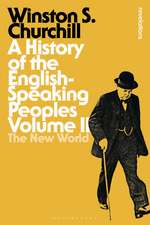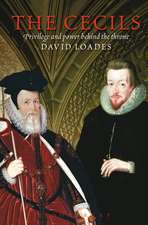Bishops and Power in Early Modern England
Autor Dr Marcus K. Harmesen Limba Engleză Paperback – 22 apr 2015
| Toate formatele și edițiile | Preț | Express |
|---|---|---|
| Paperback (1) | 237.10 lei 6-8 săpt. | |
| Bloomsbury Publishing – 22 apr 2015 | 237.10 lei 6-8 săpt. | |
| Hardback (1) | 773.39 lei 6-8 săpt. | |
| Bloomsbury Publishing – 23 oct 2013 | 773.39 lei 6-8 săpt. |
Preț: 237.10 lei
Preț vechi: 272.45 lei
-13% Nou
Puncte Express: 356
Preț estimativ în valută:
45.38€ • 46.77$ • 38.31£
45.38€ • 46.77$ • 38.31£
Carte tipărită la comandă
Livrare economică 03-17 martie
Preluare comenzi: 021 569.72.76
Specificații
ISBN-13: 9781474232968
ISBN-10: 1474232965
Pagini: 232
Ilustrații: 7 illus
Dimensiuni: 156 x 234 x 12 mm
Greutate: 0.33 kg
Editura: Bloomsbury Publishing
Colecția Bloomsbury Academic
Locul publicării:London, United Kingdom
ISBN-10: 1474232965
Pagini: 232
Ilustrații: 7 illus
Dimensiuni: 156 x 234 x 12 mm
Greutate: 0.33 kg
Editura: Bloomsbury Publishing
Colecția Bloomsbury Academic
Locul publicării:London, United Kingdom
Caracteristici
Considers the complex relationships between politics, religion and society in a crucial period in history
Notă biografică
Marcus K. Harmes is Lecturer in the Faculty of Arts at the University of Southern Queensland, Australia.
Cuprins
Introduction1. Bishops and the Reformation in England2. A Bishop and Therefore No Puritan: Episcopal Authority and 'Conforming Puritans' in Jacobean England3. Exorcising Demons and Defending Episcopacy4. Reformed Episcopacy Under Pressure5. The Uncertain Path to Restoration6. The Restoration, Episcopal Self-Representation and the Defence of VestmentsConclusion: Identifying Reformed AuthorityBibliographyIndex
Recenzii
Harmes demonstrates a deep knowledge of the historiography and acknowledges the complexity of the issues of labels and party identification, yet he carves out a unique niche by approaching the questions from different angles and overlooked approaches.
This [the book] is a brave and enterprising consideration of the role, power and reputation of bishops,and the whole system of episcopacy, in England between the Reformation and the Restoration - a time span of 150 years.
Harmes presents an interesting overview of the controversy over bishops in the Church of England from the reign of Edward VI through to the later Stuart kings ... He has ... looked at a wide range of primary materials and in many cases interprets them in a way that significantly revises current historical thinking.
Bishops and Power in Early Modern England provides intriguing insight into particular episcopal writers' views on Church government and the role of bishops. It is accessible to anyone wishing to learn more about the debates over English episcopacy. Overviews on the major historiographical debates throughout the chapters provide new readers to the subject with an interesting and informative introduction on debates over episcopal authority in early modern England.
Harmes' volume is to be commended as providing a much-needed examination of an all too often neglected viewpoint. His lively and accessible style should do much to bring fresh light to this field.
Harmes provides summaries of compelling debates that might be of use to non-specialists as a means of orientation. The book also successfully reminds us of the many ways in which history and the notion of tradition could serve polemical ends in early modern confessional/political battles.
What [Harmes] has done is provide an interesting set of case studies of arguments for and against episcopacy in the Church of England.
Harmes' book is interesting and certainly well-researched.
This [the book] is a brave and enterprising consideration of the role, power and reputation of bishops,and the whole system of episcopacy, in England between the Reformation and the Restoration - a time span of 150 years.
Harmes presents an interesting overview of the controversy over bishops in the Church of England from the reign of Edward VI through to the later Stuart kings ... He has ... looked at a wide range of primary materials and in many cases interprets them in a way that significantly revises current historical thinking.
Bishops and Power in Early Modern England provides intriguing insight into particular episcopal writers' views on Church government and the role of bishops. It is accessible to anyone wishing to learn more about the debates over English episcopacy. Overviews on the major historiographical debates throughout the chapters provide new readers to the subject with an interesting and informative introduction on debates over episcopal authority in early modern England.
Harmes' volume is to be commended as providing a much-needed examination of an all too often neglected viewpoint. His lively and accessible style should do much to bring fresh light to this field.
Harmes provides summaries of compelling debates that might be of use to non-specialists as a means of orientation. The book also successfully reminds us of the many ways in which history and the notion of tradition could serve polemical ends in early modern confessional/political battles.
What [Harmes] has done is provide an interesting set of case studies of arguments for and against episcopacy in the Church of England.
Harmes' book is interesting and certainly well-researched.
